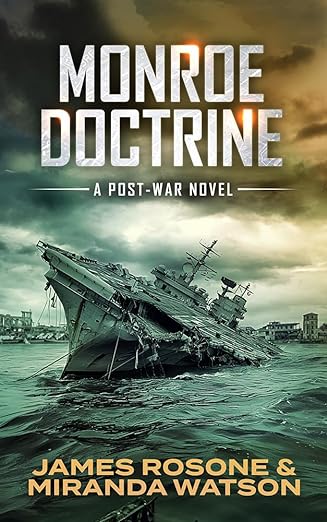Author : James Rosone
“Monroe Doctrine: A Post-War Novel” by James Rosone is a gripping continuation of the Monroe Doctrine series, set in the aftermath of a devastating global conflict. With China forced to relent and the world bruised and battle-worn, American President Maria Delgado leads the recovery efforts. Blain Wilson, entangled in political complexities, and General Song, a potential leader for China, navigate a fragile peace. The novel explores the challenges of rebuilding and the personal struggles of soldiers adjusting to a new world. Available on Kindle, this book offers a realistic and compelling portrayal of post-war resilience and hope.
Summary
“Monroe Doctrine: A Post-War Novel” by James Rosone continues the gripping saga of a world rebuilding after a devastating conflict. The story picks up with the aftermath of the Jade Dragon being crushed and China forced to relent. The victorious Allies, although triumphant on the battlefield, face a world left bruised and battle-worn. American President Maria Delgado is at the forefront of recovery efforts, navigating the complex political and social landscape of a post-war era.
Blain Wilson, a key figure in the reconstruction efforts, finds himself pulled deeper into the political rabbit hole than he ever intended. The United States, aiming to avoid the mistakes of past conflicts, limits its peacekeeping force and relies heavily on its allies. General Song emerges as a potential leader for the people of China, offering a glimmer of hope for stability.
However, the transition from war to peace is fraught with challenges. Soldiers, accustomed to the chaos of war, struggle to adjust to a peaceful world, often turning to alcohol or other means to cope. The novel explores whether reconstruction efforts will be sufficient to prevent future conflicts and which nations will rise from the ashes of war.
James Rosone’s “Monroe Doctrine: A Post-War Novel” delves into the complexities of post-war recovery, highlighting the personal and political struggles of those involved. The fate of the characters and the nations they represent is intricately woven into a narrative that keeps readers on the edge of their seats, questioning the stability of a fragile peace.
Main characters
President Maria Delgado: The American President, Maria Delgado, is a strong and determined leader. She is tasked with the monumental challenge of leading her nation through the recovery efforts after the war. Her character embodies resilience and strategic thinking as she navigates the political intricacies of a post-war world.
Blain Wilson: A central figure in the reconstruction efforts, Blain Wilson finds himself drawn deeper into the political and social challenges than he ever anticipated. His journey reflects the struggles of adjusting to a new world order and the personal sacrifices required in the pursuit of peace.
General Song: Emerging as a potential leader for the people of China, General Song is portrayed as a beacon of hope. His leadership and vision are crucial to the stability and future of a war-torn China, and his character adds depth to the narrative’s exploration of political dynamics.
Plot
The plot of “Monroe Doctrine: A Post-War Novel” revolves around the global efforts to rebuild and stabilize after a devastating war. The story is set against the backdrop of a world struggling to find its footing, with nations attempting to avoid past mistakes and ensure lasting peace.
Central to the plot is the character of Blain Wilson, who becomes increasingly entangled in the political machinations and recovery strategies. His journey is juxtaposed with President Maria Delgado’s efforts to lead the United States through this challenging period. The introduction of General Song as a potential leader for China adds another layer of complexity, as his rise to power could significantly impact the global balance.
The novel’s narrative weaves together the personal struggles of soldiers adjusting to civilian life and the broader political efforts to maintain peace. This dual focus creates a compelling storyline that keeps readers engaged from start to finish.
Writing style
James Rosone’s writing style in “Monroe Doctrine: A Post-War Novel” is both engaging and evocative. He masterfully blends detailed descriptions with dynamic dialogue, bringing the post-war world to life. Rosone’s ability to convey complex political and social issues through the experiences of his characters adds depth to the narrative.
The pacing of the novel is well-balanced, allowing for both introspective moments and intense action scenes. Rosone’s attention to detail in depicting the psychological and emotional toll of war on individuals enhances the realism of the story. His narrative style ensures that readers are not only entertained but also deeply moved by the characters’ journeys.
Themes
Resilience and Recovery: The novel explores the theme of resilience as nations and individuals strive to rebuild and recover from the war’s devastation. The efforts to reconstruct societies and create a lasting peace are central to the narrative.
Leadership and Responsibility: The responsibilities of leadership during a post-war era are examined through the characters of President Maria Delgado and General Song. Their decisions and actions underscore the complexities of guiding nations through recovery.
Personal Struggles and Adjustment: The difficulty of transitioning from a state of war to peace is a recurring theme. The personal struggles of soldiers and civilians alike are depicted with sensitivity and realism.
message
The central message of “Monroe Doctrine: A Post-War Novel” is one of hope and perseverance. The novel underscores the importance of learning from past conflicts to build a more stable and peaceful future. It highlights the resilience of the human spirit and the power of collaboration in overcoming adversity. Rosone’s work encourages readers to reflect on the complexities of post-war recovery and the necessity of enduring commitment to peace.
Strength
Realistic and Relatable Characters: The characters are well-developed and their personal struggles are portrayed with authenticity.
Engaging Narrative: The plot is compelling, with a good balance of action and introspection.
Detailed Descriptions: Rosone’s attention to detail enhances the realism of the post-war setting.
Thought-Provoking Themes: The exploration of resilience, leadership, and personal adjustment provides depth to the story.
Dynamic Dialogue: The dialogue is well-crafted, contributing to character development and plot progression.
Weakness
Pacing Issues: Some readers may find the pacing slow in certain parts of the novel.
Complex Political Context: The intricate political scenarios might be challenging for readers not familiar with the series.
Character Overload: The large cast of characters can be overwhelming and might detract from the focus on the main protagonists.
Predictable Elements: Certain plot points may seem predictable to seasoned readers of the genre.
Emotional Intensity: The emotional depth of the characters might feel heavy for some readers, affecting the overall reading experience.
conclusion
“Monroe Doctrine: A Post-War Novel” by James Rosone is a thought-provoking and engaging continuation of the Monroe Doctrine series. The novel’s realistic portrayal of post-war recovery efforts, combined with its well-developed characters and intricate plot, makes for a compelling read. While the pacing and complex political context might present challenges for some readers, the overall narrative offers a rich and rewarding experience.
Reader’s experience
Readers of “Monroe Doctrine: A Post-War Novel” can expect a deeply immersive and emotionally charged experience. The novel’s realistic depiction of post-war struggles and the resilience required to overcome them resonates on a personal level. The characters’ journeys are relatable, and their triumphs and setbacks evoke empathy and reflection. Rosone’s skillful storytelling ensures that readers remain engaged and invested in the outcome of the narrative.
recommendation
“Monroe Doctrine: A Post-War Novel” is highly recommended for readers who enjoy thought-provoking and realistic post-war narratives. Fans of James Rosone’s previous works will find this continuation satisfying and impactful. The novel’s exploration of political and personal recovery makes it a must-read for those interested in the complexities of rebuilding after conflict. Its emphasis on resilience and hope offers a timely reminder of the power of perseverance and collaboration in overcoming adversity.
Consider purchasing from this link : https://www.amazon.in/gp/product/B0D1PS3H7C?ref_=dbs_m_mng_rwt_calw_tkin_8&storeType=ebooks
Do Checkout Our other Reviews : http://reviewandratings.com/category/books/




